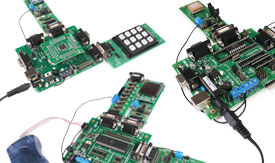Features of Flowcode 6
Graphical Programming
Simple, flowchart icons
The graphical icons which are used to develop your system within Flowcode are easy-to-use. If you're a first time developer or have little experience of developing electronic systems, Flowcode will make it easy for you to pick up the fundamentals and run with your designs.
Fast system development
Programming can be a complex, drawn out process. Ensuring your code is accurate and precise takes skill and time. With Flowcode, your job becomes easier. Program's that previously took hours to design and perfect can be brought together in minutes.
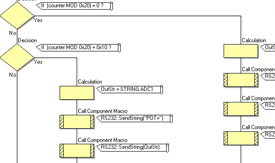
Learn and program using code
If you're more advanced in your understanding of programming, or have pre-written code you want to embed into your design, Flowcode allows you to do just that. What's more, if you're using graphical icons, you can view and learn code side-by-side with your design.
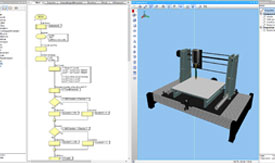
Test & Debug
Ghost Technology
Ghost Technology is an advanced way of testing or debugging your electronic system. Using Matrix's EB006v9 multiprogrammer you can monitor every pin on your PICmicro design and monitor and interpret serial data inputs and outputs.

Test your designs
For engineers, a key requirement is to ensure the designs you have developed will work when you compile to your microcontroller. Flowcode allows you to do all you need - not only can you simulate your whole electromechanical design, but also debug any faulty elements of your design and correct them using the IDE.
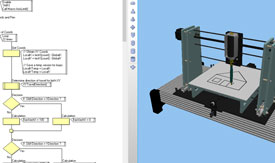
Scope and console
The revolutionary SoftScope and Console built into the Flowcode IDE allows you to see data in waveform or textual formats. The system can also decode various busses including serial, I²C and SPI. You can then link to third party hardware using pre-made components or custom DLL's to create a full SCADA system.
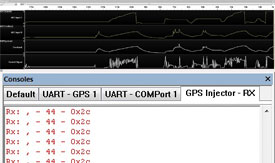
3D Simulation
Create simple designs
You can use the Flowcode system panel tools to create your own simple 3D models within the software itself. Test the accuracy of your program by creating a simple actuator or valve, or add simple shapes to your existing designs and use the built in API to control these creations during simulation.
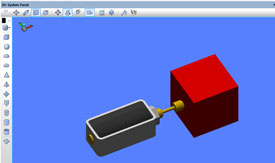
Import your designs
Flowcode integration with third party drawing packages through support for various file formats means that you can easily import your 3D drawings and designs into Flowcode and characterise and bring their electromechanical elements to life with the advanced simulation capabilities.
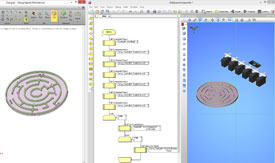
Multi-view system panel
View your designs from different angles whilst simulation is taking place within the system panel. Split-screen capabilities means you can ensure you're happy with your electronic design. What's more, simulation speed means your simulation now works close to real-time - so you can verify your design 'live'.
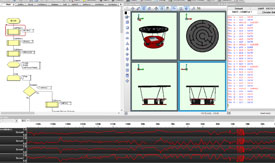
Component library
Pre-developed components
A whole suite of electromechanical components exist in our large library of parts; from simple switches and LED's to more complex communications modules. These components are developed and grown with every release of Flowcode we launch to ensure you have what you need to develop your electronic systems.
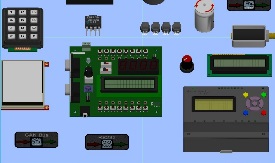
Communication components
Communications developments forms a large part of modern day electronic education and understanding. Communications including CAN bus, Bluetooth, USB, Ethernet and WIFI are widely studied across the globe. All of these components are available within the Flowcode environment.
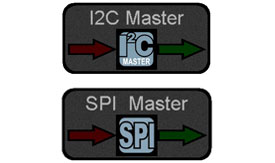
Create your own components
If Flowcode doesn't already contain the components applicable to your design, you can design your own electronic components and add them to your library in Flowcode. There is then the capability for you to use API calls to define the electrical behaviour and mechanical behaviour in simulation.
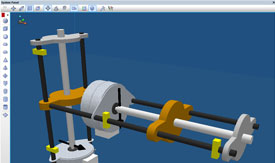
Program Platforms
E-blocks
Use Flowcode to program Matrix's electronic modules; the perfect platform for learners, engineers and electronic system developers to quickly prototype your designs on a using a rugged platform. A range of programming boards and peripheral downstream boards such as input, output, communications, prototype boards and more make this the ultimate development platform.
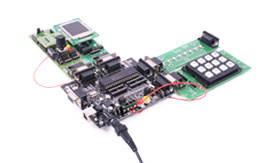
Arduino
One of the major benefits of using Flowcode, is that it simplifies the programming of Arduino platforms. AVR support means you can do more with your Arduino than you ever dreamed - you can even integrate it into our E-blocks modules with our E-blocks Arduino Shields. Flowcode supports: Duemilanove, Leonardo, Fio, LilyPad, Mega, BT, Micro, Nano, Pro, Pro Mini, Uno & Yun
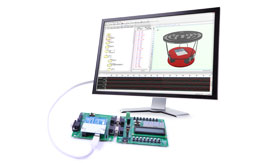
Other platforms
Not only does Flowcode offer the ability for you to work with PIC and AVR series of microcontrollers, but also with the dsPIC and ARM chip variants. A full list of chips supported by
the Flowcode IDE is available here.
